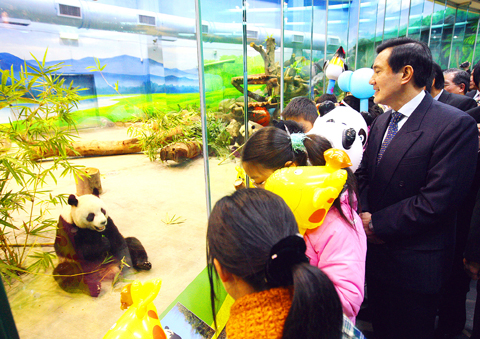Taipei Zoo's two giant pandas met their first group of visitors yesterday, including President Ma Ying-jeou (堜褙朐) and 500 students from low-income families, as the zoo opened its new Panda Hall.
The students, accompanied by Ma, former Chinese Nationalist Party (KMT) chairman Lien Chan (盓霝) and Taipei Mayor Hau Lung-bin (郝蛅獉), cheered as the two pandas, Tuan Tuan (茈茈) and Yuan Yuan (磠磠), were released into the hall's display area, making their first public appearance at about 7:30pm following a one-month quarantine period.
Speaking at the ceremony, Ma cited the importance of the pandas in the development of cross-strait relations, brushing off concerns that China was attempting to belittle Taiwan's status by using so-called "panda diplomacy."

PHOTO: CNA
"The pandas are so cute and I think we can look at the arrival of the pandas from a more humane perspective, rather than politicizing the issue," Ma said yesterday at the Panda Hall.
Lien, who accepted the pandas as a gift from Chinese President Hu Jintao (胡錦濤) during a trip to China in 2005, expressed his joy at the long-delayed arrival of the pandas and said he expected the two pandas to bear offspring in Taipei.
Ma, Hau and Lien later joined the students in releasing giant panda balloons to mark the opening of the Panda Hall.
Huang Shih-ting (笟蓏擸), a fourth-grader from Taipei's Li Xing Primary School, was among those to get a first glimpse of the pandas. Watching the pandas eating bamboo and carrots in the indoor display area, Huang said she wanted to take them home.
"They are so cute, and I am so happy to see them. I wish I could take them home," she said.
Another student, Chen Ya-ru (蠊鈭瑼), said the 10-minute visiting window was too short.
"I will come to see the pandas again," she said.
The three-story hall, which cost the zoo more than NT$300 million (US$9.9 million) to build, occupies more than 1,400m昌 and will officially open to the public tomorrow.
In addition to the outdoor and indoor display areas on the first floor, the panda facility includes a gift shop, media center, tourist service center and a convention center on the second and third floors.
Outside the zoo, Democratic Progressive Party Taipei City Councilor Lee Ching-feng (軝杬壼) protested against the city government's high-profile celebration of the opening of the Panda Hall, urging Ma, a former Taipei mayor, to visit the nearby Maokong Gondola site instead and apologize for the problematic cable car system whose operation has been suspended since October.
"Don't forget about the gondola just because the pandas have arrived. The gondola has experienced so many problems. Shouldn't Ma, who initiated the project, be held responsible?" Lee said.
The zoo has installed eight new counters at its entrance to issue number slips to visitors who wish to see the pandas. After obtaining a number, visitors can visit the Panda Hall at the time designated on the slip. Time spent inside the hall will be limited to 10 minutes.
Operating hours at the zoo from tomorrow to Sunday will be from 8:30am until 5:30pm. Normal operating hours (9am to 5pm) will resume on Feb. 2.

The CIA has a message for Chinese government officials worried about their place in Chinese President Xi Jinping’s (習近平) government: Come work with us. The agency released two Mandarin-language videos on social media on Thursday inviting disgruntled officials to contact the CIA. The recruitment videos posted on YouTube and X racked up more than 5 million views combined in their first day. The outreach comes as CIA Director John Ratcliffe has vowed to boost the agency’s use of intelligence from human sources and its focus on China, which has recently targeted US officials with its own espionage operations. The videos are “aimed at

STEADFAST FRIEND: The bills encourage increased Taiwan-US engagement and address China’s distortion of UN Resolution 2758 to isolate Taiwan internationally The Presidential Office yesterday thanked the US House of Representatives for unanimously passing two Taiwan-related bills highlighting its solid support for Taiwan’s democracy and global participation, and for deepening bilateral relations. One of the bills, the Taiwan Assurance Implementation Act, requires the US Department of State to periodically review its guidelines for engagement with Taiwan, and report to the US Congress on the guidelines and plans to lift self-imposed limitations on US-Taiwan engagement. The other bill is the Taiwan International Solidarity Act, which clarifies that UN Resolution 2758 does not address the issue of the representation of Taiwan or its people in

US Indo-Pacific Commander Admiral Samuel Paparo on Friday expressed concern over the rate at which China is diversifying its military exercises, the Financial Times (FT) reported on Saturday. “The rates of change on the depth and breadth of their exercises is the one non-linear effect that I’ve seen in the last year that wakes me up at night or keeps me up at night,” Paparo was quoted by FT as saying while attending the annual Sedona Forum at the McCain Institute in Arizona. Paparo also expressed concern over the speed with which China was expanding its military. While the US

SHIFT: Taiwan’s better-than-expected first-quarter GDP and signs of weakness in the US have driven global capital back to emerging markets, the central bank head said The central bank yesterday blamed market speculation for the steep rise in the local currency, and urged exporters and financial institutions to stay calm and stop panic sell-offs to avoid hurting their own profitability. The nation’s top monetary policymaker said that it would step in, if necessary, to maintain order and stability in the foreign exchange market. The remarks came as the NT dollar yesterday closed up NT$0.919 to NT$30.145 against the US dollar in Taipei trading, after rising as high as NT$29.59 in intraday trading. The local currency has surged 5.85 percent against the greenback over the past two sessions, central